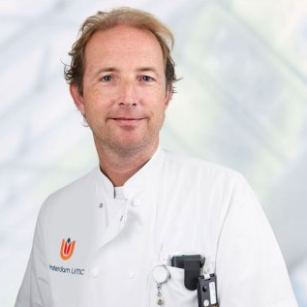
The first theme is prevention of disease. Secondary prevention is also the prevention of the damage we do to our patients through our diagnostics and treatments. We are currently investigating whether we can better estimate the vulnerability of older patients who undergo a radical cystectomy for muscle-invasive bladder cancer. The goal is to reduce the frequency of complications or a protracted course after surgery. Which patients may benefit from a prehabilitation program? Within a multicenter study, we are trying to develop an algorithm that will help us detect and treat complications in this group of patients earlier.
The second theme is improved selection of patients for the right treatment. Scrapping unproven care is part of a broader strategy to limit the influx of patients. After all, there are not enough staff members to adequately tackle the expected explosion in healthcare demands in the coming years. The healthcare budget must also remain within limits. Because 'the sky is the limit', unfortunately that doesn't work. But can we use chemotherapy or extremely expensive immunotherapy for other purposes? Perhaps we should not opt for more and more therapy. For the cost balance. If something is added to the care and one place, something has to be taken away somewhere else. In short, to keep healthcare affordable, clear choices will have to be made, as mentioned. This concept was developed within the KWF-sponsored preprevencys study. A study that aims to perform less complex and burdensome operations in patients who have been pretreated with chemotherapy. We showed that in a group that received chemotherapy and subsequently underwent radical cystectomy, approximately 20 to 30% had a complete pathological response. We further showed that if we do a genetic test on the original tumor tissue, i.e., DNA sequencing, this percentage increases to approximately 70-75% in a subgroup of patients. This selection of patients with a favorable genetic profile could therefore forego burdensome follow-up treatment such as radical cystectomy. The question is whether patients dare to forego surgery (or chemoradiation). And, what the long-term oncological outcome is in this group of patients who follow a wait-and-see protocol after chemotherapy and refrain from radical cystectomy.
The third theme is the use of data and meta-data. This is the use of patient data from multiple hospitals and multiple healthcare institutions at the same time. All this with the aim of seeing the big picture in the causality of disease and in the effect of our diagnostics and treatments in patients with bladder and prostate cancer. New techniques are currently being developed to store and share data responsibly. The I-PROCARE project uses the technique of 'federated learning', decentralized data storage. We use these digital techniques for safe data processing in patients with prostate cancer.

